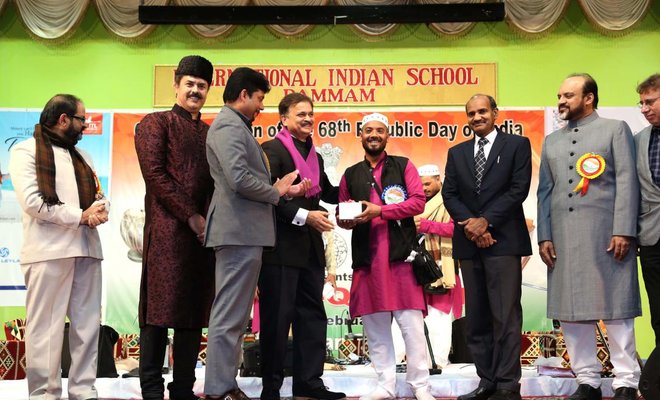Qawwali event regales thousands of Indian expats
Tue 14 Feb 2017, 09:33:47

DAMMAM: The Indian Embassy, in association with the Indian Council of Cultural Relations, organized a Mehfil-e-Qawwali (evening of Qawwali) at the International Indian School in Dammam.
Qawwali is a form of music and is believed to have originated in the 13th century in India.
It has been presented at the palaces of Mughal emperors, and popularized by Bollywood and other mainstream cultures.
Chief guest Ahmad Javed, Indian ambassador to Saudi Arabia, spoke about celebrating the diversity of India with the Indian community in the Eastern Province.
This is the first time the International Indian School in Dammam has hosted a cultural event of this kind.
On behalf of the Indian Embassy, Dr. Hifzur Rahman, second secretary (political, information and culture), introduced the performers: Naushad Sabri and a five-member group from Uttar Pradesh.
Visiting Saudi Arabia for the first time, the group performed in Jeddah and Jubail before coming to Dammam.
Sabri has been a Qawwal for 28 years. He and the group have to their credit 14 Qawwali albums on love, faith and devotion.
Side-singers Mohammed Umar Daraz and Danish
Hussain played the harmonium and banjo, respectively.
Hussain played the harmonium and banjo, respectively.
Arshad Hussain and Shehzad Hussain performed on the percussion instruments of hand drums and larger drums (tabla and dhol).
The Qawwals entertained the crowd with popular Qawwalis.
“It has been a memorable evening, not only for the school but also for the large Indian community here,” said Mohammad Abdul Waris, chairman of the International Indian School in Dammam. “Through the collective efforts of the Indian Embassy and the Indian Council of Cultural Relations, we were able to witness a culturally rich and fervent event.”
Javed told Arab News that such events “promote cross-cultural understanding between the members of a diverse, secular and multilingual country like India.”
He said the Mehfil-e-Qawwali is among many such activities planned by the embassy for the Eastern Province.
His message to the Indian community in the province is: “This is the beginning of strong cultural ties between the two countries. It reflects the relationship between people that will lead to economic development and further enhancement of the age-old relations of trade and commerce.”
No Comments For This Post, Be first to write a Comment.
Most viewed from International
Most viewed from World
AIMIM News
Latest Urdu News
Most Viewed
May 26, 2020
Do you think Canada-India relations will improve under New PM Mark Carney?
Latest Videos View All
Like Us
Home
About Us
Advertise With Us
All Polls
Epaper Archives
Privacy Policy
Contact Us
Download Etemaad App
© 2025 Etemaad Daily News, All Rights Reserved.



.jpg)






.jpg)
.jpg)








.jpg)
.jpg)
.jpg)
.jpg)
.jpg)

















